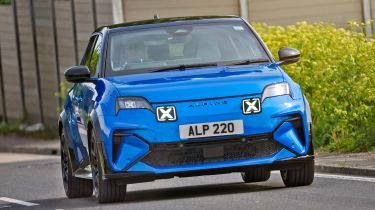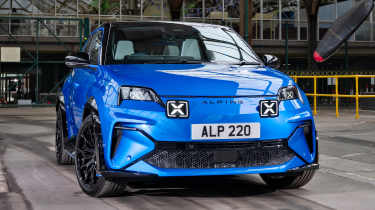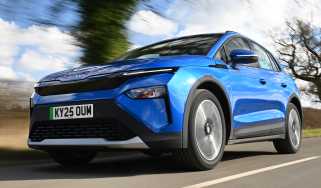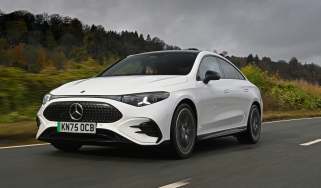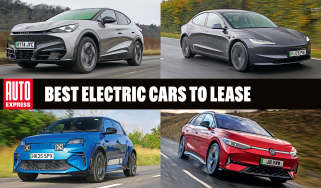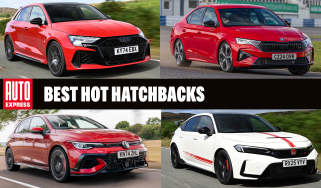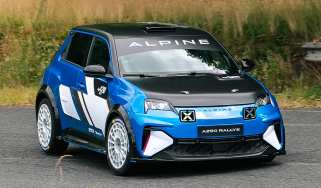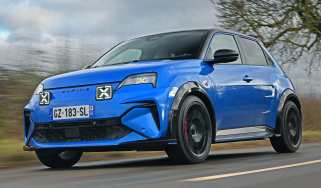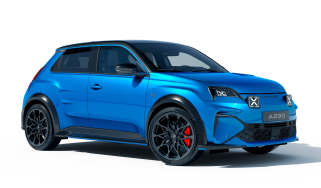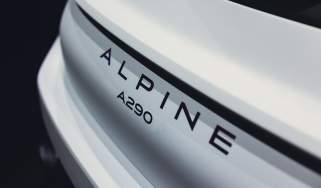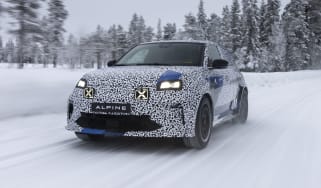Alpine A290 review
The Alpine A290 all-electric hot hatchback is rounded, well priced, and has desirability in spades

Our opinion on the Alpine A290
The Alpine A290 isn’t as specialised or engaging to drive as the brilliant Alpine A110 sports car, but it’s still a stylish fast hatchback with good driving dynamics and just enough performance to fulfil its sporty mantra. While we feel there might be even more to extract from the chassis, it still adds up to an impressive all-round package built upon the solid foundations of the more sensible Renault 5. The A290 was Highly Commended in the hot hatch category of our 2025 New Car Awards.
About the Alpine A290
The Alpine brand was revived in 2017 and for several years it produced only one model: the featherweight Alpine A110 sports car. Now, though, the A110 is giving way to a new wave of electric cars, and the A290 was the first arrival, a hot hatch based on the Renault 5 electric supermini.
Alpine is actually planning to launch seven brand new models before the end of the decade, but a key deliverable for every single one, including the A290, is driver engagement. And there’s historical precedent for Alpine getting its fingers on a contemporary Renault supermini, going back to the seventies and the original R5.
Compared to the Renault 5, the Alpine has been heavily reworked under the skin. The Dieppe-based squad of engineers have gone to town on the chassis; the existing Renault front suspension setup has been ditched, and in its place sits a new subframe to enable a track width that grows 60mm wider than the R5.
The geometry is unique to the A290, while its dampers are backed up by hydraulic bump stops, which allow for more compliance towards the top of the suspension’s travel. Elsewhere, there’s a more powerful front-mounted electric motor in one of two states of tune, four-piston Brembo brakes, extroverted styling and a more driver-focused cabin.
Alpine A290 prices and latest deals
Thankfully, the A290 is much more affordable, especially now because it’s eligible for the maximum £3,750 'Band 1' of the Government’s Electric Car Grant (ECG). Because of that, prices start at a little over £30,000 for the base car GT+, rising to around £34,500 for the GTS+, with the GT Performance+ models sitting between the two at just shy of £33,000.
Combined, Alpine and its parent company, Renault, have several EVs that are eligible for the Government's Electric Car Grant (ECG), including the Auto Express Small SUV of the Year, the Renault 4, and our Affordable Electric Car of the Year, the Renault 5.
If you're interested in getting yourself an Alpine A290, we can help. Configure your ideal Alpine A290 now to get top offers from local dealers, check out the latest Alpine A290 leasing deals. You can even sell your existing car for a great price with Auto Express Sell My Car.
Performance & driving experience
Pros |
|
Cons |
|
The most notable difference between the A290 and a Renault 5 is the electric motor, which isn’t just more powerful – with between 178bhp and 216bhp – but also slightly larger. By extension this also means the Alpine has a unique front subframe and completely new suspension geometry on axles that are 60mm wider.
It also picks up the clever hydraulic bump stops that were introduced on the last-generation RenaultSport Megane – something we think would be quite a useful addition to a high-performance electric car.
So does the A290 actually feel different to the Renault 5? The short answer is a solid yes, because even if you were to ignore the extra power, there’s a tangible difference between the two that largely centres around the steering. Not only is the Alpine’s rack a little bit faster than the Renault’s, it also feels much more precise just off-centre and has a little more resistance. That’s not to say it’s chock-full of feel, but it’s definitely more engaging. The A290 is also very well damped, which is important, given that the basic ride is quite firm, although never crashy.
Performance, 0-60mph acceleration and top speed
When you do put your foot down, performance is pretty much as you’d expect of something with 218bhp and a near 1.5-tonne kerbweight. Despite the car’s focus on performance, there’s not much snap to the acceleration; instead, it has more of a forceful surge. For maximum performance, there’s an additional ‘OV’ or overboost function activated from a BMW M-style button on the steering wheel, but it still doesn’t make the A290 anything more than brisk.
There are four driver modes – Save, Comfort, Sport and Personal – and these change the e-motor’s mapping and outputs, as well as the steering weight and the virtual engine noise. The final control on the steering wheel is a small blue toggle, which controls the regenerative braking; this has four settings, ranging from a near one-pedal driving mode at one end to a full coast mode at the other.
Floor the throttle in Sport mode and there’s a small amount of torque steer to remind you this is a front-wheel-drive car, and thanks to the instant torque of the e-motor, you’re required to manage front-end traction out of tighter corners. There’s no mechanical limited-slip differential – Alpine says a virtual differential using the brakes is more effective – but it certainly helps liven up things from the driver’s seat.
| Model | Power | 0-62mph | Top speed |
| A290 GT+ | 178bhp | 7.4s | 99mph |
| A290 GTS+ | 216bhp | 6.4s | 106mph |
Town driving, visibility and parking
From the moment you get rolling in the A290, it’s clear that there’s a level of sophistication to the chassis. Yes, it’s firm over bumps, but the quality of the damping - aided by hydraulic bump stops - means it’s never irritatingly so. There’s no brittle feeling or fidget at low speeds, nor is there any crashiness across much larger bumps - only a taut control that only comes with a serious performance car. The pedals and steering all feel naturally weighted, too. All of this means that the A290 is one of those rare cars that can still be enjoyable to drive even at low speeds and in everyday driving.
Country road driving and handling
Head out onto more open roads, and that setup really starts to come into its own. Such composure, combined with the huge grip levels from the Michelin PS5 tyres, enables the driver to carry plenty of corner speed, even across challenging and bumpy B-roads. All the while, the A290 reassures that it’s not going to bite back, so it makes it very easy to approach the car’s limits of grip. The steering has a pleasing rate of response that allows the driver to build up a great flow along a road, too.
For all its strengths, the A290 never quite delivers the hardcore hot hatch experience we’d hoped for. An element of this comes from the car’s weight - at 1,479 kg, it’s still a fairly hefty car by supermini standards, so it never quite feels up on its tiptoes nor has the pointy front end of its spiritual ancestors from RenaultSport. There’s a degree of mid-corner adjustability with the throttle, but a little more tendency for the car to rotate from the rear would add a little more excitement. The brake pedal has excellent feedback, though, which gives the driver plenty of confidence to lean on it hard.
For all its handling prowess, we’d love to see the A290 equipped with a limited slip differential. Other high performance, compact EVs like the Abarth 600e and Alfa Romeo Junior Veloce both use a diff to brilliant effect, allowing the driver to hop on the accelerator to deploy their significant, instant torque to the road even while plenty of steering lock is applied. Alpine says a virtual differential using the brakes is more effective, but based on the evidence of the A290 we struggle to agree. Here the systems give the impression that they’re just holding things back to prevent unwanted wheelspin, which leaves you impatient for that power to arrive.
Motorway driving and long-distance comfort
Much like the R5 on which it's based, the A290 is fairly quiet and refined on a motorway, so it feels well adapted to long distance cruises. The firm suspension setup doesn’t feel intrusive in the slightest, only adding to the high speed stability. It’s very composed over the sort of longer, larger bumps that are more common on motorways.
“Move off from a standstill, and there’s wonderful progression to all of the main controls. The throttle response builds naturally as you squeeze the pedal, and the steering feels light.” - Alex Ingram, chief reviewer.
Range, charging & running costs
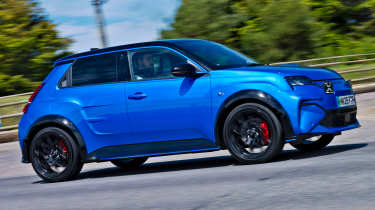
Pros |
|
Cons |
|
Electric range, battery life and charge time
All A290s have the 52kWh battery pack that’s also found in the Renault 5. This delivers a range of around 235 miles in GT+ trim, which is around 20 miles less than the best in the R5 line-up. The more powerful GT Performance+ and GTS+ versions, which also swap the standard Michelin Sport EV tyres for grippier Pilot Sport 5S rubber, can cover around 225 miles before they’re out of juice.
Every A290 is fitted with a heat pump to help preserve the car’s range in colder conditions, while its 100kW maximum charging speed is exactly the same as rivals like the Alfa Romeo Junior Veloce and Abarth 600e, so it’s par for the course in this class. Use a rapid charging point capable of that speed, and topping up the battery from 15 to 80 per cent will take about 30 minutes. Utilise a typical 7.4kW home wallbox charger, and it’ll take around 8.5 hours to fully recharge an A290.
| Model | Battery size | Range | Insurance group |
| A290 GT+ | 52kWh | 235 miles | 27 |
| A290 GTS+ | 52kWh | 225 miles | 29 |
Insurance groups
The A290’s insurance groups are divided according to the power output of the motor; 178bhp trim levels rank in group 27, while the 217bhp versions sit in group 29. That’s a little bit higher than a key Alpine rival, the MINI JCW Electric, which attracts a group 26 rating.
Tax
All A290 variants dip below the luxury car surcharge threshold of £40,000, which means that between years two and six, the VED rates stand at £195 per year.
Being all-electric also means the A290 is an appealing choice for business users who like to have some fun on the weekends, as it allows the hot hatch to attract a three per cent Benefit-in-Kind (BiK) rating for company car tax.
Depreciation
Current estimates suggest that the A290 is going to hold on to just under half of its original value after three years or 36,000 miles, which is about average for the new-car market as a whole. For comparison, the MINI JCW E should retain up to 53 per cent after the same period, which is ever so slightly better.
To get an accurate valuation for a specific Renault Scenic model, check out our free car valuation tool...
Interior, design & technology
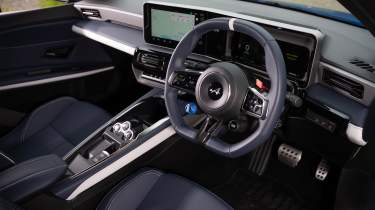
Pros |
|
Cons |
|
The Alpine’s design is based on the Renault 5’s, but benefits from more complex detailing and arguably more sophistication. The exterior is definitely less retro than the R5, and has more complex elements front and rear, including a set of rally-inspired running lights and a unique rear door impression that references the original Renault 5 Turbo. The interior also has a more grown up, sophisticated atmosphere, by swapping the sustainable fabrics for leather, among other changes.
Interior and dashboard design
Inside, the Alpine’s basic dash layout is also shared with the Renault, but in place of retro touches like the vertical stitching on the passenger side are more contemporary faux-leather materials in blues and silvers. The seats are also common to both Alpine and Renault, which is no bad thing because they’re brilliantly supportive and comfortable at the same time.
What is new in the A290 is the centre console, which is a decidedly mixed bag. On the high-mounted console you’ll find a simple three-button gear selector, which replaces the thin wand you’ll find on the column of an R5. This is excellent news because it frees up some space behind the steering wheel – a particular gripe of the Renault – but it means there’s no longer any cup-holder. This also has the effect of reducing the size of the centre cubby, and while there is still a wireless phone charger, there’s nowhere to put other small items like keys or wallets.
Materials and build quality
The overall feel of the A290’s cabin is a cut above that of the majority of other cars of this size. Physical switches for the climate control are a great feature, the steering wheel is lovely to hold, and any hard plastics on show are largely kept low down.
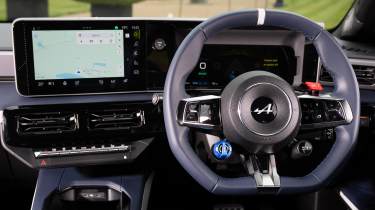
Infotainment, sat-nav and stereo
Alpine’s digital interfaces are also based on the same Google backbone as in the Renault 5, making the system super-quick to respond, and easy to navigate and personalise. In front of the driver sits a 10.25-inch display with some quite elaborate graphics and plenty of variability in its layout. It can be a little trickier to read than its Renault counterpart, but it does suit the Alpine’s sportier image.
Specific to the A290 is the Alpine Telemetrics system; this sub menu allows the driver to access live telemetry including power application, G-force readings, lap times and brake temperatures, plus built-in analytics and tips to help drivers improve their technique.
The 10.1-inch main touchscreen features built-in Google Maps and other Google services without needing to connect to your phone – although if you do, Android Auto and Apple CarPlay are both wireless. GTS+ models also have an upgraded stereo system that performs well above the expected level for a car of this size and price.
“While another electric sporty hatch, the Abarth 500e, has an undeniable sense of occasion, it can’t match the Alpine’s quality of finish.” - Alex Ingram, chief reviewer.
Boot space & practicality
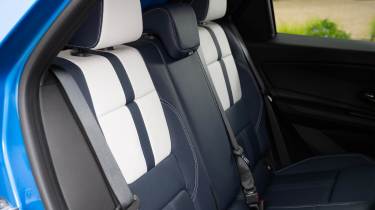
Pros |
|
Cons |
|
The A290 isn’t a particularly large car, but the back seats are just about adequate for carrying adults from time to time. However, because it’s front-wheel drive there’s no storage under the bonnet, and a lack of drinks holders is also a rather surprising oversight.
Dimensions and size
The Alpine A290 measures 3,997mm long, 1,820mm wide and 1,520mm tall, meaning it’s slightly longer and wider than the Renault 5, and larger in every proportion than the MINI JCW Electric.
|
Dimensions comparison | |||
| Model | Alpine A290 | MINI Cooper E | Abarth 600e |
| Length | 3,997mm | 3,858mm | 4,187mm |
| Width | 1,823mm | 1,756mm | 1,779mm |
| Height | 1,512mm | 1,460mm | 1,557mm |
| Wheelbase | 2,530mm | 2,526mm | 2,559mm |
| Boot space | 326 litres | 210 litres | 360 litres |
Seats & passenger space
The A290 features a taller centre console compared to the Renault 5, which makes the cabin feel more like a cockpit for the driver, plus there’s a good amount of side bolstering to the seats that you won’t slide about in them when attacking corners. The thick F1-inspired steering wheel has a bright red ‘overtake’ button and a separate ‘recharge’ dial for quickly and easily switching between four modes for the regenerative braking.
There's one glaring omission to the A290’s cabin, and that’s the lack of any cupholders anywhere. Relocating the drive buttons onto the centre console has removed the area where they are found on the 5; if you’re a coffee drinker, the A290 will likely make your morning routine very tricky. That aside, the driving position is good by hot hatch standards; not the lowest, but well placed relative to the wheel and pedals.
Interior accommodation in the back of the A290 is pretty much identical to that of the Renault 5 E-Tech - that is to say that it’s not the most roomy of places to sit. It’s not the overall space that’s the problem - knee room and head room are largely similar to cars at the more compact end of the supermini spectrum, like the Toyota Yaris - the issue is that the seat base is quite low relative to the floor height, so longer-legged occupants will find their thighs are lacking support. Two sets of Isofix child seat mounts, hidden behind folding plastic covers, are installed in the back, with further Isofix points on the front passenger seat.
Boot space
At 326 litres (or 300 litres when the subwoofer of the GTS’s sound system is taken into account), the A290’s boot is a fairly reasonable size for such a small car. Loading heavier items inside can be a little tricky due to the high load lip. A lack of under-bonnet storage isn’t unusual for a compact EV, but does take the edge off the car’s versatility.
“Neither car is outstandingly spacious, but the A290 is more practical than the MINI Cooper E. For a start, its five-door layout makes it much easier to get into the back.” - Alex Ingram, chief reviewer.
Reliability & safety
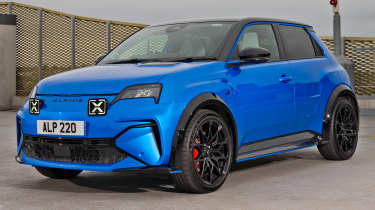
Pros |
|
Cons |
|
Safety organisation Euro NCAP has applied the Renault 5’s four-star rating to the A290, because they’re so similar. The rating was marked down by the driver assistance category, where the A290 has a system that, while able to monitor the driver for fatigue, doesn’t do so for distraction.
Regulations mandate that systems like speed-limit warnings and lane-keep assist are switched on every time the car is turned on. Given the unreliable nature of the former in so many cars, the ease in which these systems can be turned off is something worth considering, and in the Alpine, they’re as easy to disable as they come. Program your preferred settings in the touchscreen, and they’ll be applied to a button just to the right of the steering wheel; from then on, simply press this button twice to apply your settings.
Alpine didn’t feature in our 2025 Driver Power Customer satisfaction survey, but parent company Renault scooped an impressive sixth place overall, out of the 31 brands included.
| Euro NCAP safety ratings | |
| Euro NCAP safety rating | 4 stars (2024) |
| Adult occupant protection | 80% |
| Child occupant protection | 80% |
| Vulnerable road user protection | 76% |
| Safety assist | 68% |
Buying and owning
Our best buy: Alpine A290 GTS+
While a base model priced at around £30,000 (with the government electric car grant) might sound like an impressive amount of car for the money, it takes relatively little to upgrade it to the A290 GTS+, which is more substantial in terms of performance and content. On a monthly basis, you’d definitely be better off choosing the higher-specification model. It’s worth remembering that the Renault 5 offers a similar driving experience for a lot less money, though.
Alpine A290 alternatives
Electric hot hatchbacks have long felt like the holy grail for mainstream manufacturers, and it’s a marketplace that’s now pretty chock full of options – both expected and unexpected. The key competitor for the Alpine is the MINI John Cooper Works Electric, which is more powerful than its French foe and certainly playful, but is let down by its incredibly firm ride.
Beyond this, the smaller and much less powerful Abarth 500e is only slightly cheaper, so doesn’t quite stack up with this new competition. However, the larger Abarth 600e, and even more interestingly, the Alfa Romeo Junior Veloce, offer some compelling options, although at an admittedly higher price tag. Both offer a sharper experience than the Alpine that some hot hatch fans will really appreciate.
Look away from the old-fashioned rivals, and cars like the Volvo EX30 Dual Motor, Smart #1 Brabus, and MG4 XPower all offer considerably more performance for considerably less money. However, none are really the product of an immersive engineering program, without much attention laid upon the chassis to cope with all of that power. An MG4 XPower flat-out is a hair-raising experience.
Alpine A290 pictures
Frequently Asked Questions
Alpine provides a three-year warranty on all its electric cars, with unlimited mileage over the first two years, and then up to 60,000 miles for the remaining third year, depending on which comes first. The battery warranty runs for eight years or 100,000 miles.
